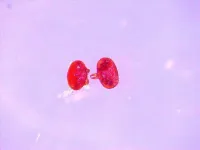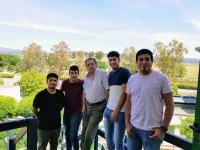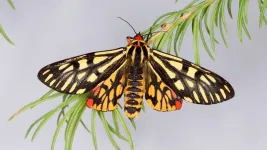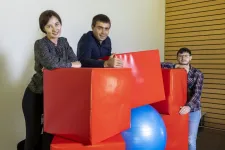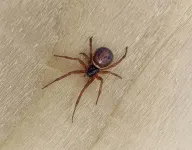Low on antibodies, blood cancer patients can fight off COVID-19 with T cells
New Penn Medicine study shows how T cells compensate when other immune cells go down
2021-05-27
(Press-News.org) PHILADELPHIA--Antibodies aren't the only immune cells needed to fight off COVID-19 -- T cells are equally important and can step up to do the job when antibodies are depleted, suggests a new Penn Medicine study of blood cancer patients with COVID-19 published in Nature Medicine. The researchers found that blood cancer patients with COVID-19 who had higher CD8 T cells, many of whom had depleted antibodies from cancer treatments, were more than three times likelier to survive than patients with lower levels of CD8 T cells.
"It's clear T cells are critical in terms of the early infection and to help control the virus, but we also showed that they can compensate for B cell and antibody responses, which blood cancer patients are likely missing because of the drugs," said co-senior author Alexander C. Huang, MD, an assistant professor of Hematology-Oncology in the Perelman School of Medicine at the University of Pennsylvania and Penn's Institute of Immunology. "This is important when we think about how to improve the care of cancer patients with COVID. We need to maximize all the arms of the immune system, especially if we know that one particular arm of the immune system is down."
Additionally, because the current COVID-19 mRNA vaccinations induce both antibody and T cell responses, the findings suggest that vaccination of blood cancer patients could provide protection through T cell immunity, despite the absence of antibodies.
The team--which included researchers from Memorial Sloan Kettering Cancer Center--studied hospitalized patients with both solid tumors and hematologic cancers admitted to four Penn Medicine hospitals and Memorial Sloan Kettering to better understand the immune determinants of COVID-19 deaths.
Supporting previous studies, patients with blood cancer were more likely to die from COVID-19 than patients with solid tumors or without cancer. Out of 100 patients admitted to Penn Medicine hospitals, 22 had a blood cancer diagnosis and were 2.6 fold more likely to die compared to patients with solid cancer, the authors found.
Immune profiling of 214 patient blood samples at Memorial Sloan Kettering and Penn Medicine revealed that patients with blood cancers, in particular patients treated with anti-CD20 antibodies, had decreased B cells and antibodies compared to patients with solid cancers and patients without cancer. Additional analyses also revealed that among patients with blood cancers, including patients treated with chemotherapy and anti-CD20 antibodies, those with higher CD8 T cell counts had a 3.6 fold greater likelihood of survival compared to those with lower counts.
Thus, the authors concluded, CD8 T cells may influence recovery from COVID-19 when B cells and antibodies are deficient.
"As a clinician, this work can help us advise patients while we wait for more vaccine specific studies to be published," said first author Erin Bange, MD, a fellow in the division of Hematology-Oncology and Penn Center for Cancer Care Innovation. "We can inform patients that while their vaccine response likely will not be as robust as their friends/family who don't have blood cancers, it is still critical and potentially lifesaving."
The next step is to better understand the immune responses blood cancer patients with COVID-19 experience after they recover and how protective their immunity is without B cells and antibodies, the researchers said.
INFORMATION:
Co-authors on the study include Nicholas Han, a research assistant in Penn's Institute of Immunology, Ronac Mamtani, MD, an assistant professor of Hematology-Oncology in Penn's Perelman School of Medicine, and Santosha A.Vardhana, MD, PhD, a medical oncologist at Memorial Sloan Kettering.
ELSE PRESS RELEASES FROM THIS DATE:
2021-05-27
PULLMAN, Wash. -- A new fungus strain could provide a chemical-free method for eradicating mites that kill honey bees, according to a study published this month in Scientific Reports.
A team led by Washington State University entomologists bred a strain of Metarhizium, a common fungus found in soils around the world, to work as a control agent against varroa mites. Unlike other strains of Metarhizium, the one created by the WSU research team can survive in the warm environments common in honey bee hives, which typically have a temperature of around 35 Celsius (or 95 F).
"We've known that metarhizium could kill mites, but it was expensive and didn't last long because the fungi died in the hive heat," said Steve Sheppard, professor in WSU's Department of Entomology and corresponding ...
2021-05-27
A research group at the University of Córdoba evaluated the commercial mixture formulated in a laboratory and the tank-based mixture of two herbicides to determine which method is more effective in terms of weed control and environmental impact.
In 2017 the company Nufarm Europe proposed to the Higher Technical School of Agricultural and Forestry Engineering (ETSIAM) at the UCO a study of the results of two products having a significant agronomic impact: the herbicides glyphosate and 2,4-D (synthetic auxin). After three years of research, they concluded that the commercial mix produced in the company's laboratories is more effective than manual mixes produced in tanks.
To do this, they used in vivo techniques (tests with greenhouse ...
2021-05-27
MAY 26, 2021 -- Researchers from UTSA, the University of Central Florida (UCF), the Air Force Research Laboratory (AFRL) and SRI International have developed a new method that improves how artificial intelligence learns to see.
Led by Sumit Jha, professor in the Department of Computer Science at UTSA, the team has changed the conventional approach employed in explaining machine learning decisions that relies on a single injection of noise into the input layer of a neural network.
The team shows that adding noise--also known as pixilation--along multiple layers of a network provides a more robust representation of an image that's recognized by the AI ...
2021-05-27
The Menetries' tiger moth (Arctia menetriesii) is one of the rarest and most poorly studied Palaearctic moth species. Even though its adult individuals are large and brightly coloured, they are difficult to spot, because they aren't attracted to light, they're not active at night, and they fly reluctantly. Currently, the species only inhabits two countries - Finland and the Russian Federation, and is included in the Red Lists of both, as Data Deficient in the former and Vulnerable in the latter.
For 13 years, researcher Evgeny Koshkin of the Institute of Water and Ecology Problems of the Far ...
2021-05-27
Men aged 65 and over should monitor their sleep patterns and seek medical advice after a warning from Flinders University experts that disrupted slumber can be linked to cognitive dysfunction.
In a new article published in the Journal of Sleep Research, the Adelaide Institute for Sleep Health research group studied a group of 477 middle-aged and older men's attention and processing speed in relation to their sleep.
The participants from the Florey Adelaide Male Ageing Study undertook cognitive testing and a successful sleep study.
"Less deep sleep and more light sleep is related to slower responses on cognitive function tests," says lead author Jesse Parker. ...
2021-05-27
To really appreciate what a team of researchers led by Maksym Kovalenko and Maryna Bodnarchuk has achieved, it is best to start with something mundane: Crystals of table salt (also known as rock salt) are familiar to anyone who has ever had to spice up an overtly bland lunch. Sodium chloride - NaCl in chemical terms - is the name of the helpful chemical; it consists of positively charged sodium ions (Na+) and negatively charged chloride ions (Cl-). You can imagine the ions as beads that strongly attract each other forming densely packed and rigid crystals like the ...
2021-05-27
Scientists at Nanyang Technological University, Singapore (NTU Singapore) have developed a new biomaterial made entirely from discarded bullfrog skin and fish scales that could help in bone repair.
The porous biomaterial, which contains the same compounds that are predominant in bones, acts as a scaffold for bone-forming cells to adhere to and multiply, leading to the formation of new bone.
Through laboratory experiments, the NTU Singapore team found that human bone-forming cells seeded onto the biomaterial scaffold successfully attached themselves and started multiplying - a sign of growth. They also found that the risk of the biomaterial triggering an inflammatory response is low.
Such a scaffold could be used to help with the regeneration of ...
2021-05-27
The parents of children with rare diseases face exceptional circumstances which influence their role as parents. Sometimes, the role of caregivers is added to that of parents. On other occasions, especially with the most serious cases, the former becomes more prominent than the latter. There are also cases in which both roles coexist separately, allowing them to be parents and caregivers in equal measure. However, whichever group they belong to, they need trust and to overcome fear in order to live their experience without overwhelming anxiety.
This is one of the findings of an open-access study published in the International Journal of Environmental ...
2021-05-27
NUI Galway study confirms that the Noble False Widow spider does have public health implications
Research team have established a DNA database to allow clinicians dealing with cases to confirm the species identity using genetic analysis
Epidemiology of bites reveals that almost all bites occurred in and around the home, and 88% of bites occurred when the victim was either asleep in bed or when the spider was trapped in clothing
In parts of Ireland and Britain, the False Widow spider has become one of the most common species of spiders found in and around urban habitats
A team of scientists from NUI Galway have published a new study showing that Noble False Widow spiders ...
2021-05-27
Eating habits amongst the young changed during the lockdown imposed due to COVID-19 and worsened in the case of those belonging to socioeconomically disadvantaged groups. These are the chief findings of an open access study published in specialist journal Nutrients, headed by researchers Alícia Aguilar Martínez, of the Universitat Oberta de Catalunya, and Marina Bosque Prous, of the UOC and UManresa, as part of the DESKcohort project of the interuniversity Epidemiology and Public Health research group GRESP.
The study, of 303 Catalan young people aged between 12 and 18, sought to establish how this age group's diet had changed from March to May 2020, in terms of both eating behaviours and the products consumed. The goal was to collect data to ascertain ...
LAST 30 PRESS RELEASES:
[Press-News.org] Low on antibodies, blood cancer patients can fight off COVID-19 with T cells
New Penn Medicine study shows how T cells compensate when other immune cells go down
